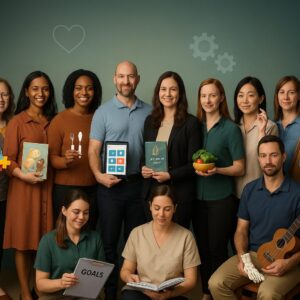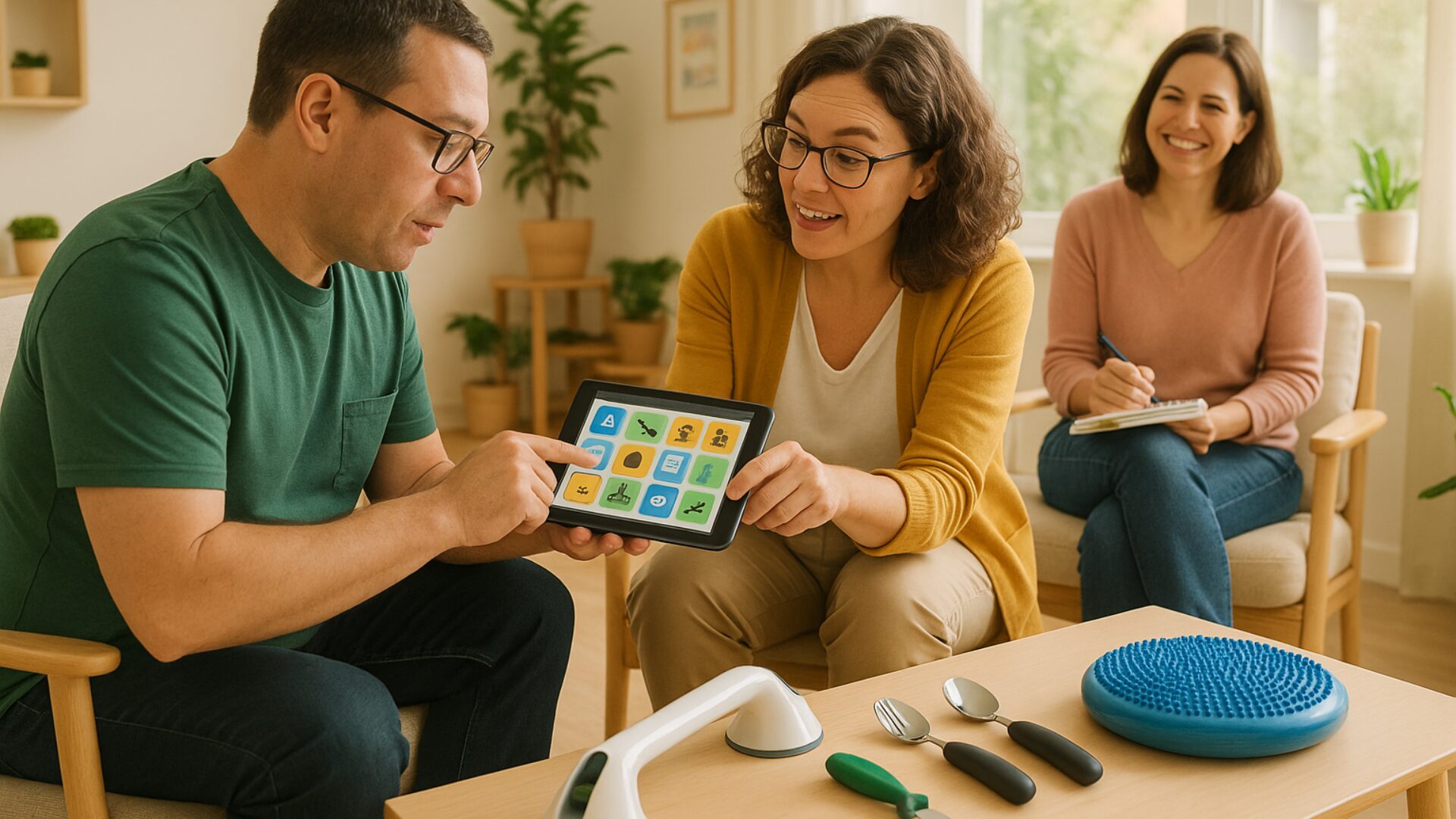Have you ever stared at your NDIS plan wondering what exactly “Improved Daily Living” means and how this funding can transform your daily life? You’re not alone. As an NDIS content specialist who’s guided hundreds of participants through their funding journey, I’ve seen firsthand how this powerful funding category often remains underutilised simply because people don’t fully understand its potential.
Whether you’re looking to master new skills, access specialised therapy, or provide better training for your support network, this funding category might hold the key to achieving your goals. Let’s cut through the confusion and explore exactly what Improved Daily Living funding can be used for, with practical examples that will help you maximise every dollar in your NDIS plan.
Table of contents
- Key Takeaways
- Understanding Improved Daily Living Funding
- Professional Supports Available
- Assessments and Reports: Building Your Foundation
- Early Childhood Intervention (Under 7 Years)
- Therapy Supports (Over 9 Years)
- Daily Living Skills Training
- Support for Families and Carers
- Specialised Support Areas
- Flexibility in Funding Allocation
- Conclusion
- Action Steps
- Frequently Asked Questions
Key Takeaways
- Improved Daily Living funding covers assessments, therapy, training, and strategic development to boost independence and community participation
- This funding supports both children (under 7) and adults (over 9) with different focuses for each age group
- You can access a wide range of allied health professionals including occupational therapists, psychologists, speech pathologists, and many others
- Funding can be used flexibly and adjusted between different service types as your needs change.
- Support for family members and carers is included to enhance your overall care network
Understanding Improved Daily Living Funding
Improved Daily Living falls under the Capacity Building section of your NDIS plan. Unlike Core supports that help with everyday assistance, Capacity Building focuses on developing your skills and independence for the long term.
This category provides funding for assessment, training, strategy development, and therapeutic supports to help you build skills, increase independence, and participate more fully in your community. In the NDIS myplace portal, you’ll find this listed as “CB Daily Activity.”
According to Specialised Plan Services, this funding aims to “promote skill development, or to build a participant’s capacity for independence and community participation” through a range of professional supports and services.
Professional Supports Available
One of the most valuable aspects of Improved Daily Living funding is the wide range of qualified professionals who can deliver services under this category. These include:

- Development Educators
- Early Childhood Educators
- Allied Health Professionals including:
- Occupational Therapists
- Speech Pathologists
- Physiotherapists
- Psychologists
- Exercise Physiologists
- Dietitians
- Social Workers
- Audiologists
- Art and Music Therapists
- Podiatrists
- Nurses
- Therapy Assistants (under supervision)
Each professional brings specialised expertise to address different aspects of your daily living challenges and goals.
Assessments and Reports: Building Your Foundation
Before diving into therapy or training, comprehensive assessments provide a crucial foundation for understanding your specific needs and establishing a baseline for progress.
According to Leap in!, Improved Daily Living funding can cover various assessments including:
- Functional capacity assessments
- Occupational therapy assessments
- Assistive technology assessments
- Developmental assessments
- Speech and language assessments for children
- Supported accommodation assessments
These assessments serve two important purposes: they provide insights into your specific needs and capabilities, and they create documentation that can help justify funding requests in future NDIS plan reviews.
This thorough assessment and report are key to receiving the funding you need. Whether you need a specific piece of equipment or a block of therapy aimed at helping you achieve an NDIS goal, a high-quality assessment and report will boost your chances of receiving funding approval.”
Early Childhood Intervention (Under 7 Years)
For families with young children under seven years old, Improved Daily Living funding takes on special significance through early intervention supports. These supports help children under the age of seven with developmental delays or disabilities, their families, caregivers, and key workers in increasing their capacity for functional independence and social participation.
These services can be delivered in various settings including the home, early childhood educational settings, or in the community. They include:
- Developmental assessments
- Strategy development
- Training for parents and caregivers
- Early childhood therapeutic intervention
The ultimate goal is to support families and children to work toward increased independence in daily activities and social participation, with a goal of reducing the need for future support.
Therapy Supports (Over 9 Years)
For participants over nine years old, Improved Daily Living funding focuses on therapy supports to improve functional capacity for those with established disabilities.
The NDIS defines these supports as services that “facilitate functional improvement” and notes they must “directly relate to a participant’s significant and permanent functional impairment.”
Common therapy supports include:
- Physiotherapy to improve mobility, strength, and balance
- Occupational therapy for daily living skills
- Speech therapy for communication and swallowing
- Psychology services for mental health and behaviour support
- Exercise physiology for fitness and physical functioning
- Art and music therapy for emotional, cognitive, and social development
- Dietetics for nutrition management
- Audiology for hearing-related challenges
For example, Active Ability explains that exercise physiologists might help with “developing muscle strength and balance for community activities” or “increasing fitness and endurance for sport participation,” while dietitians might assist with “implementing texture-modified diets to reduce choking risk” or “managing health conditions through nutrition.”
Daily Living Skills Training
Beyond formal therapy, Improved Daily Living funding can pay for practical skills training to boost your independence. This training covers a wide range of everyday activities that many of us take for granted.
This can include:
- Programs for cooking, cleaning, personal hygiene, and self-care
- Communication and social skills development
- Learning to use mobility aids or assistive technology
- Developing strategies for improved behavior
- Training in budgeting, meal planning, shopping, and transportation
- Tutoring or job coaching for education or work goals
This practical training builds concrete skills that increase independence and reduce reliance on ongoing support from others.
Support for Families and Carers
Your Improved Daily Living funding isn’t just for you—it can also provide valuable training for the people who support you.
This funding can be used to train those delivering that care including family members, guardians, or friends who want to become carers but lack necessary skills.
This training might include:
- Safe transfer techniques for carers
- Education about health conditions and dietary management
- Guidance on supporting behaviour management strategies
- Training in the use of assistive technology
- Supervision of home exercise programs
According to Specialised Plan Services, the current national rate for Training for Carers/Parents is $77.00 per hour (as of January 2025).
Specialised Support Areas
Beyond these broader categories, Improved Daily Living funding can cover several specialised support areas:
Nursing Care
It is worth noting that funding can pay for “nursing care directly related to the individual’s disability that is not covered by the usual health system or another part of their NDIS plan.” This might include training in medication management, wound care, or operating necessary medical equipment.
Hearing Services
Audiologists can provide services not covered under Medicare, helping address hearing-related challenges that impact daily functioning.
Specialised Driver Training
If your disability impacts your ability to drive, specialised driver training with adaptations for your specific needs can be funded. According to Specialised Plan Services, this “should be in response to an assessment by a Specialist Driver Trained Occupational Therapist.”
Low-Cost Assistive Technology
Improved daily funding can cover low-cost assistive technology that supports the delivery of other Capacity Building services, particularly for enabling telehealth and online participation.
Device guidelines include:
- Maximum spending limit of $750 on electronic devices
- Device must directly relate to your disability
- Cannot be for entertainment, education, or gaming purposes
- Must be the basic model with lowest necessary specifications
- Wi-Fi connectivity only (mobile connections not covered)
Multidisciplinary Teams
For complex needs, this funding can support a coordinated multidisciplinary approach to capacity building where various health and social care professionals work together to create a comprehensive plan of care tailored to your specific needs.
Flexibility in Funding Allocation
One of the most valuable aspects of Improved Daily Living funding is its flexibility. You can adjust how your funding is distributed among different service types based on your changing needs and priorities.
Also, you can change how money allocated under the Improved Daily Living budget of your NDIS plan gets used. For example, you might initially decide to use 40 percent of your funding on physiotherapy, 30 percent on occupational therapy and 30 percent on exercise physiology. However, you might later decide to use a larger percentage on exercise physiology.
This flexibility allows you to respond to your changing circumstances and focus on the supports that provide the greatest benefit at any given time.
Conclusion
Improved Daily Living funding represents a powerful opportunity to enhance your independence, develop crucial skills, and improve your quality of life. From professional assessments and therapeutic interventions to practical skills training and support for your carers, this funding category offers remarkable flexibility to address your unique needs.
By understanding the full range of supports available through Improved Daily Living funding, you can make strategic choices that maximise the impact of your NDIS plan. Remember that all supports funded through this category should connect directly to your NDIS goals and meet the “reasonable and necessary” criteria.
Action Steps
- Review your current NDIS plan to identify your Improved Daily Living funding allocation
- Consider which assessments would be most valuable to establish your baseline needs
- Research qualified professionals in your area who can provide the specific supports you need
- Develop a strategic plan for using your funding that aligns with your NDIS goals
- Discuss training options with your family members or carers to enhance your support network
Frequently Asked Questions
Check your NDIS plan document or myplace portal. Improved Daily Living funding will be listed under Capacity Building supports, sometimes referred to as “CB Daily Activity” in the myplace portal. If you’re unsure, contact your Local Area Coordinator or Support Coordinator for clarification.
Massage and chiropractic services are only funded if you have received direct approval from the NDIA, and the support is directly related to your disability (for example, Multiple Sclerosis).
Yes, telehealth options are available for many therapy services.
Core supports (Assistance with Daily Living) provide direct assistance with everyday tasks, while Improved Daily Living funding focuses on building your skills and capacity to perform these tasks more independently over time.
Core supports typically fund direct assistance with everyday activities (like personal care or community access), while Improved Daily Living focuses on building your skills and capacity through therapy, training, and assessment. Think of Core as supporting your immediate needs, while Improved Daily Living is an investment in your future independence.

Temitope Isola is an NDIS content specialist and freelance writer. She works as a freelance writer, focusing especially on the NDIS and mental health space. Her goal is simple: to help service providers speak clearly and genuinely to the people they care for. When she writes, she always keeps the reader’s needs at the forefront of her mind.

